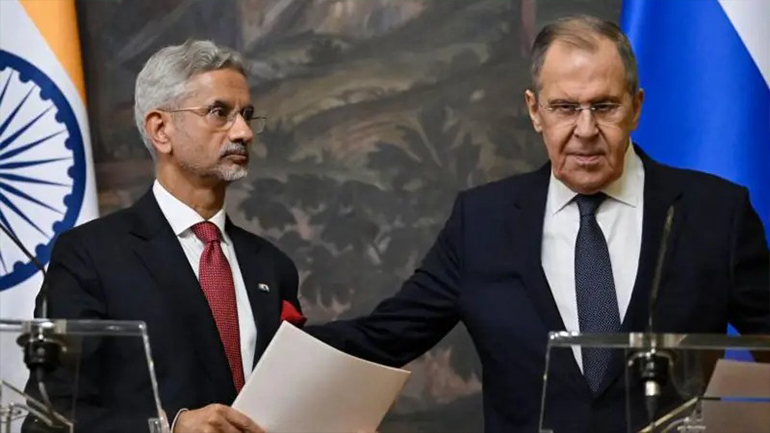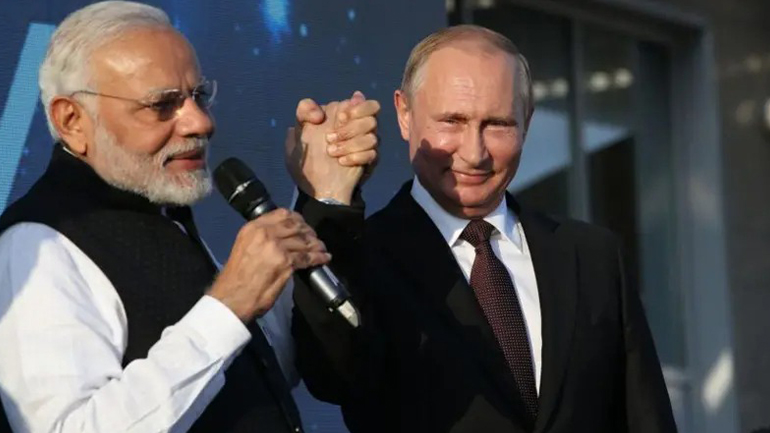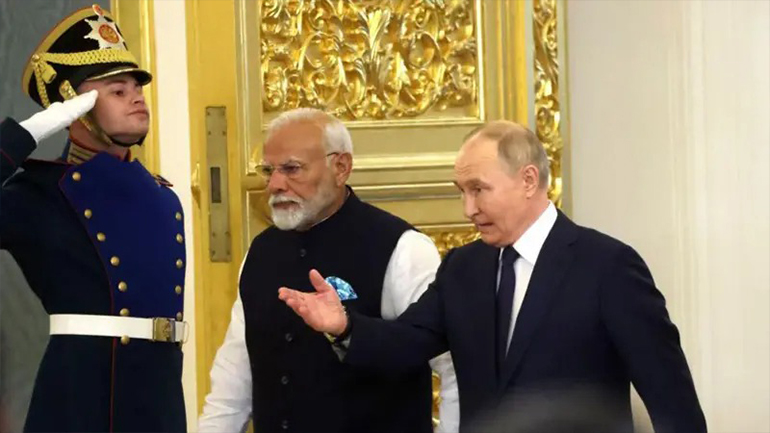

Whenever the relationship between Russia and India's defense ties is discussed, people often recall the warmth of the Soviet support for India during the Cold War era. In 1955, Soviet leader Nikita Khrushchev visited India. During that visit, he said, “We are very close to you. Even if you call us from the top of a mountain, we will stand beside you.” This marked the beginning of deep Cold War alliances that shaped the India-Russia strategic partnership for decades. Even when the Soviet Union dissolved in 1991 and only Russia remained, the trust in the Russia-India defense ties endured. While Western countries were hesitant over the Kashmir issue, the Soviet Union had declared that Kashmir is an integral part of India, a position that highlighted Russia's stance on Kashmir.

During the Cold War, the Soviet Union repeatedly used its UN veto on Kashmir to block United Nations Security Council resolutions aimed at internationalizing the issue. India has always maintained that Kashmir is a bilateral issue, and Russia has consistently supported this stance. Among the permanent members of the UN Security Council, the Soviet Union was the only country to block UN resolutions on Kashmir in 1957, 1962, and 1971. So far, Russia has used its veto power six times in the Security Council to block resolutions against India, most of which were related to Kashmir. The Soviet Union had also vetoed a United Nations Security Council resolution against India’s military intervention to end Portuguese rule in Goa. In August 2019, when India revoked Kashmir’s special status, Russia once again supported India. However, after the Pulwama attack and India’s subsequent military action inside Pakistan, Russia’s response was not seen as particularly encouraging for India. Russia’s reaction was quite balanced and neutral. It called on both India and Pakistan to de-escalate tensions and even offered to mediate. Russian President Vladimir Putin’s spokesperson, Dmitry Peskov, stated, “India is our strategic partner, and Pakistan is also our partner. We value our relationships with both Delhi and Islamabad.”
On May 3, Indian External Affairs Minister S. Jaishankar and Russian Foreign Minister Sergey Lavrov held talks. Sharing details of the conversation, the Russian Foreign Ministry stated, "The Russian Foreign Minister has called on both Delhi and Islamabad to resolve the conflict through bilateral dialogue," reflecting Russia's neutral stance and its peace appeal by Russia amid ongoing India-Pakistan tensions. Commenting on this statement by the Russian Foreign Ministry, Tanvi Madan, a senior fellow at the Brookings Institution think tank, reposted it, saying, "In less than 12 years, Russia has invaded Ukraine twice and is now telling India to resolve its conflict with Pakistan through dialogue," highlighting the complexities of Russia-Pakistan diplomacy and Russia mediation offer. In response to her post, an X (formerly Twitter) user commented, "What has happened to Russia? Our Prime Minister went to Ukraine and said Russia and Ukraine should resolve their conflict through dialogue, but India should have stood by a tried and tested friend like Russia. This is Newton's third law—every action has an equal and opposite reaction," indirectly referencing the shifting dynamics in Russia-India relations. Trump’s mediation offer on Kashmir placed India in a tough spot. After the Pahalgam attack and rising tensions: Whose side will China take in the India-Pakistan conflict? Pakistan claims to have diverted an Indian BrahMos missile: Can hypersonic missiles be “blinded”? India and Pakistan military power comparison: From massive armies to advanced jets, ballistic missiles, and drones. Responding to the user, Tanvi Madan said, "It's not accurate to claim that India didn’t support Russia during the Ukraine war in 2022, hence Russia didn’t support India in return. In 2019, after Pulwama as well, Russia had urged India to maintain peace and had offered mediation," again reflecting Russia's neutral stance and Russia's mediation offer. Replying to Tanvi’s remarks, Alexey Zakharov, an expert on India-Russia relations at the ORF think tank, noted, "India-Russia relations have experienced ups and downs since the 1990s. In 2002, Putin also attempted to mediate between India and Pakistan, but India rejected the offer. Beyond changing geopolitics, the five permanent UN Security Council members share a consensus that they should play a role in reducing tensions." Agreeing with Alexey, Nivedita Kapoor, an assistant professor at HSE University in Moscow, wrote, "I agree with Alexey on the nuclear point. As a nuclear power, Russia has a responsibility to work with other major powers to de-escalate tensions. When two nuclear powers are heading toward war, a call for peace is only natural," underscoring the critical nature of nuclear powers' conflict and peace appeal by Russia.
When China openly supports Pakistan in any conflict, it is natural for India to expect that Russia would do the same in its favor. However, Russia prefers to avoid this dilemma and tries to maintain a balance between India and China, reassuring both of its partnership. That is why, when its two major allies stand opposed to each other, Russia generally avoids taking a clear side. We asked Dr. Rajan Kumar, Associate Professor at the Centre for Russian and Central Asian Studies at Jawaharlal Nehru University in New Delhi, how he views Russia's stance on the India-Pakistan conflict. Dr. Rajan Kumar stated, "Until now, Russia used to express unilateral support for India on issues related to Pakistan and Kashmir. But this time, Russia called for bilateral talks and even offered mediation, which did not reflect an explicitly pro-India stance." He acknowledged that Russia still leaned slightly toward India, but the statement was very balanced and not entirely in India's favor. "Lavrov’s statement was very balanced." He pointed out three reasons for this shift:
India's stance on the Russia-Ukraine war – While India leaned toward Russia, it did not offer the full support Moscow had hoped for. The Indian Prime Minister even visited Ukraine and emphasized resolving the conflict through diplomacy and respecting the sovereignty of nations.
India's growing closeness with the United States – There has been a significant increase in defense cooperation between India and the U.S., while India’s defense partnership with Russia has weakened.
Russia's strategic needs – Russia has lifted sanctions on the Taliban and is seeking to expand its influence in Afghanistan through Pakistan. In such a scenario, President Putin does not want to completely sideline Pakistan.

President Vladimir Putin's last visit to India was in December 2021, which means he has not visited India since the war with Ukraine began in February 2022. On the other hand, he has visited China twice. During this period, he has also visited other countries. Notably, Putin did not attend the G20 summit held in New Delhi in September 2023. In recent years, India has appeared increasingly isolated within organizations where Russia plays a major role, such as the Shanghai Cooperation Organization (SCO). Narendra Modi did not attend the SCO summit in July 2024. India held the SCO presidency in 2023, but it was seen as a low-profile chairmanship. The summit was organized virtually by India. Meanwhile, India hosted a high-profile G20 summit during its presidency in the same year. Trade between the two countries reached $68 billion last year, but India imported $60 billion worth of oil from Russia, highlighting a skewed trade balance. Between 2009 and 2013, 76% of India’s arms imports came from Russia, but between 2019 and 2020, that figure dropped by 36%. Professor Sanjay Kumar Pandey from the Centre for Russian and Central Asian Studies at Jawaharlal Nehru University says that even during the Russia-Ukraine war, India was not against Russia, but its support was not one-sided. Professor Pandey adds, “We must not forget that Pakistan was never completely inaccessible to Russia. In the 1965 war between Pakistan and India, Russia remained neutral and acted as a mediator. The Tashkent Agreement was brokered by the Soviet Union, and it was not in India’s favor—India had to pull back its troops after the deal.” “However, during the 1971 war, Russia was certainly on India’s side. But the world has changed significantly since then. Despite this, I believe Russia still stands with us. India purchased the S-400 missile system from Russia despite U.S. opposition, and even now, Russia played a key role in preventing a Pakistani attack.” Since Pakistan’s relations with Western countries have weakened, there has been increasing discussion about closer ties with Russia. In 2023, bilateral trade between Russia and Pakistan reached $1 billion, the highest ever. Last year, Russian Deputy Prime Minister Alexei Overchuk also supported Pakistan's inclusion in BRICS.

Powered by Froala Editor